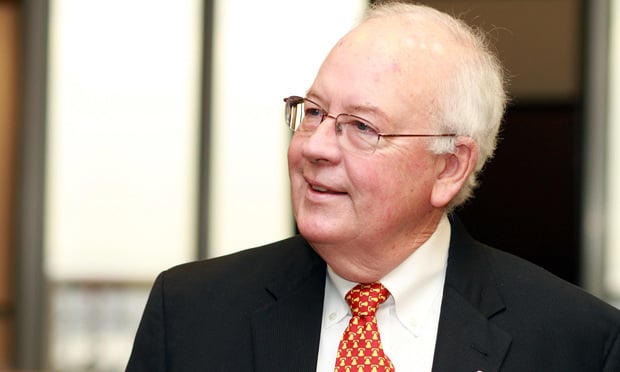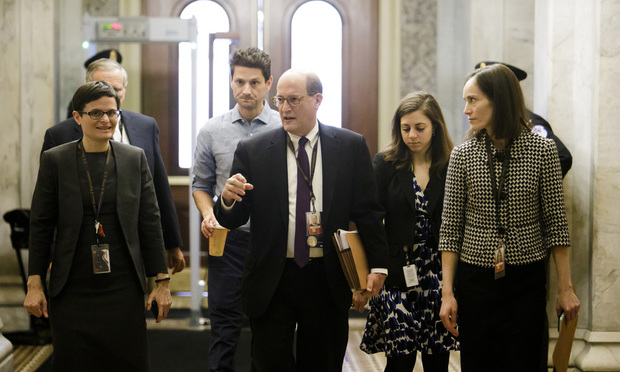House Throws Ken Starr's Words Back at Trump in Tax Returns Fight
Judge Trevor McFadden stayed the House's lawsuit seeking Trump's tax returns earlier this month. House lawyers say Trump's arguments against impeachment mean the judge should let the case proceed.
January 28, 2020 at 08:23 PM
6 minute read
 Kenneth Starr was the guest speaker at the Atlanta chapter of the Federalist Society's January luncheon on Jan. 17, 2019. The event was held at Kilpatrick Stockton's Atlanta office.
Kenneth Starr was the guest speaker at the Atlanta chapter of the Federalist Society's January luncheon on Jan. 17, 2019. The event was held at Kilpatrick Stockton's Atlanta office.
Attorneys for the House are asking a judge in Washington, D.C., to lift a stay he placed on their lawsuit seeking President Donald Trump's federal tax returns, arguing that Trump's impeachment lawyers have contradicted Justice Department attorneys over standing issues in the case that the judge has raised concerns about.
U.S. District Judge Trevor McFadden of the District of Columbia paused the case earlier this month, noting that a three-judge panel on the U.S. Court of Appeals for the D.C. Circuit had raised concerns over whether the House could go to court against the executive branch in the lawsuit seeking former White House counsel Don McGahn's testimony. He said he would make a decision on how to let the tax case proceed after the appellate court panel ruled on the issue of the House's standing, and he expected the circuit to rule "expeditiously."
In a court filing Tuesday, the House lawyers noted that two weeks had passed since McFadden had issued the stay, and that he had told the attorneys they could file a motion to lift the stay if they felt the D.C. Circuit's decision wasn't made quickly enough. The House team asked that he either rule on a motion to dismiss filed by the DOJ last year, or partially lift the stay and allow briefings on the merits to continue.
The lawyers also tied in arguments made by Trump's attorneys during the impeachment trial, in which they have argued the House should have gone to court to obtain further evidence before moving forward with articles of impeachment against the president. That conflicts with the DOJ's claims in several House lawsuits, including the one in McFadden's court, that the House can never go to court against the administration.
"In the impeachment trial, President Trump has contended, in no uncertain terms, that the House was required to pursue judicial enforcement of its subpoenas to various Executive Branch officials and that the Article III courts are available for that purpose. That flatly contradicts the position President Trump and the Justice Department (DOJ) have advanced in this case," the House lawyers wrote Tuesday.
They quoted statements made by several of Trump's lawyers during the Senate trial, including Jay Sekulow, Harvard Law's Alan Dershowitz and former independent counsel Kenneth Starr, in which they said the courts were the proper forum to oversee disputes between the legislative and executive branches.
"Former Judge Starr urged the House to '[g]o to court,' making clear that President Trump understands that the judges of this court stand ready to decide expeditiously the House's subpoena-enforcement cases," the House lawyers wrote, before quoting from Starr's arguments Monday on the Senate floor.
"President Trump is telling the Senate that cases like this one can and should be litigated in a highly expedited way, while here he argues that the court should delay," they added.
The House lawyers further argued that the lawsuit for Trump's federal tax returns "has been beset by delay." They noted that they filed the complaint in July and presented arguments on a motion to dismiss in November, but a decision was not issued before McFadden stayed the case.
The lawyers said that if McFadden did not take action soon, it "could seriously jeopardize the committee's ability to secure compliance with its demands for information and take whatever legislative and oversight steps it deems appropriate once it receives the material, before the end of this Congress."
McFadden had appeared ready to rule for the House over the DOJ's motion to dismiss at the November oral arguments, but said during a phone conference earlier this month that he didn't "think it makes sense for me to get out in front of" the D.C. Circuit's decision on whether the House can sue the Trump administration.
The House team protested the move during the phone conference; One attorney, Megan Barbero, labeled McFadden's thoughts on when the McGahn ruling will come down "really pure guesswork about what the D.C. Circuit will do and how long it will take them."
The House has previously seized on the discrepancy between the arguments made by Trump's impeachment counsel during the Senate trial and the ones by the DOJ lawyers arguing on behalf of Trump in the House lawsuits.
 Douglas Letter, general counsel to the U.S. House of Representatives, arrives at the U.S. Capitol in Washington for the start of the Senate Impeachment trial against President Donald Trump, on Jan. 21, 2020.
Douglas Letter, general counsel to the U.S. House of Representatives, arrives at the U.S. Capitol in Washington for the start of the Senate Impeachment trial against President Donald Trump, on Jan. 21, 2020.House general counsel Douglas Letter pointed out the conflicting positions in letters last week to the D.C. Circuit panels overseeing the McGahn case and one seeking grand jury materials redacted from former special counsel Robert Mueller's report.
He did so again earlier Tuesday, highlighting Starr's claims that the Senate is operating as a court during the impeachment trial as evidence that impeachment is a judicial proceeding, one of the few times grand jury information can be released by a court. The DOJ lawyers have argued otherwise.
"We're in court. We're not just in court, with all due respect to the chief justice and the Supreme Court of the United States," Starr told the Senate on Monday. "We're in democracy's ultimate court."
The DOJ and Trump's attorneys have claimed that there is no space between the two arguments on when the House can go to court, including in a letter Tuesday to the D.C. Circuit panel overseeing the Mueller grand jury case.
"The committee's letters urging the court to take notice of what has occurred in the impeachment trial are anomalous for another reason," DOJ lawyer Mark Freeman wrote in that letter. "The extensive, ongoing debate in the Senate over what evidence the Senate should or should not consider in the trial underscores the oddity of the committee's view that federal courts, rather than the Senate itself, should decide whether there is a 'particularized need' for certain evidence."
Read more:
Ken Starr Warns Against Impeachment as Political Weapon, Urges Quick Acquittal of Trump
'Cannot Have It Both Ways': Doug Letter Criticizes Trump Lawyers for Contradictions on Impeachment
'Go Find a Lawyer, Somewhere': Schiff Slams Trump Impeachment Claims Rejected by Allies
This content has been archived. It is available through our partners, LexisNexis® and Bloomberg Law.
To view this content, please continue to their sites.
Not a Lexis Subscriber?
Subscribe Now
Not a Bloomberg Law Subscriber?
Subscribe Now
NOT FOR REPRINT
© 2025 ALM Global, LLC, All Rights Reserved. Request academic re-use from www.copyright.com. All other uses, submit a request to [email protected]. For more information visit Asset & Logo Licensing.
You Might Like
View All
Government Attorneys Face Reassignment, Rescinded Job Offers in First Days of Trump Administration
4 minute read
RFK Jr. Will Keep Affiliations With Morgan & Morgan, Other Law Firms If Confirmed to DHHS
3 minute read
Am Law 200 Firms Announce Wave of D.C. Hires in White-Collar, Antitrust, Litigation Practices
3 minute readLaw Firms Mentioned
Trending Stories
- 1New York-Based Skadden Team Joins White & Case Group in Mexico City for Citigroup Demerger
- 2No Two Wildfires Alike: Lawyers Take Different Legal Strategies in California
- 3Poop-Themed Dog Toy OK as Parody, but Still Tarnished Jack Daniel’s Brand, Court Says
- 4Meet the New President of NY's Association of Trial Court Jurists
- 5Lawyers' Phones Are Ringing: What Should Employers Do If ICE Raids Their Business?
Who Got The Work
J. Brugh Lower of Gibbons has entered an appearance for industrial equipment supplier Devco Corporation in a pending trademark infringement lawsuit. The suit, accusing the defendant of selling knock-off Graco products, was filed Dec. 18 in New Jersey District Court by Rivkin Radler on behalf of Graco Inc. and Graco Minnesota. The case, assigned to U.S. District Judge Zahid N. Quraishi, is 3:24-cv-11294, Graco Inc. et al v. Devco Corporation.
Who Got The Work
Rebecca Maller-Stein and Kent A. Yalowitz of Arnold & Porter Kaye Scholer have entered their appearances for Hanaco Venture Capital and its executives, Lior Prosor and David Frankel, in a pending securities lawsuit. The action, filed on Dec. 24 in New York Southern District Court by Zell, Aron & Co. on behalf of Goldeneye Advisors, accuses the defendants of negligently and fraudulently managing the plaintiff's $1 million investment. The case, assigned to U.S. District Judge Vernon S. Broderick, is 1:24-cv-09918, Goldeneye Advisors, LLC v. Hanaco Venture Capital, Ltd. et al.
Who Got The Work
Attorneys from A&O Shearman has stepped in as defense counsel for Toronto-Dominion Bank and other defendants in a pending securities class action. The suit, filed Dec. 11 in New York Southern District Court by Bleichmar Fonti & Auld, accuses the defendants of concealing the bank's 'pervasive' deficiencies in regards to its compliance with the Bank Secrecy Act and the quality of its anti-money laundering controls. The case, assigned to U.S. District Judge Arun Subramanian, is 1:24-cv-09445, Gonzalez v. The Toronto-Dominion Bank et al.
Who Got The Work
Crown Castle International, a Pennsylvania company providing shared communications infrastructure, has turned to Luke D. Wolf of Gordon Rees Scully Mansukhani to fend off a pending breach-of-contract lawsuit. The court action, filed Nov. 25 in Michigan Eastern District Court by Hooper Hathaway PC on behalf of The Town Residences LLC, accuses Crown Castle of failing to transfer approximately $30,000 in utility payments from T-Mobile in breach of a roof-top lease and assignment agreement. The case, assigned to U.S. District Judge Susan K. Declercq, is 2:24-cv-13131, The Town Residences LLC v. T-Mobile US, Inc. et al.
Who Got The Work
Wilfred P. Coronato and Daniel M. Schwartz of McCarter & English have stepped in as defense counsel to Electrolux Home Products Inc. in a pending product liability lawsuit. The court action, filed Nov. 26 in New York Eastern District Court by Poulos Lopiccolo PC and Nagel Rice LLP on behalf of David Stern, alleges that the defendant's refrigerators’ drawers and shelving repeatedly break and fall apart within months after purchase. The case, assigned to U.S. District Judge Joan M. Azrack, is 2:24-cv-08204, Stern v. Electrolux Home Products, Inc.
Featured Firms
Law Offices of Gary Martin Hays & Associates, P.C.
(470) 294-1674
Law Offices of Mark E. Salomone
(857) 444-6468
Smith & Hassler
(713) 739-1250









